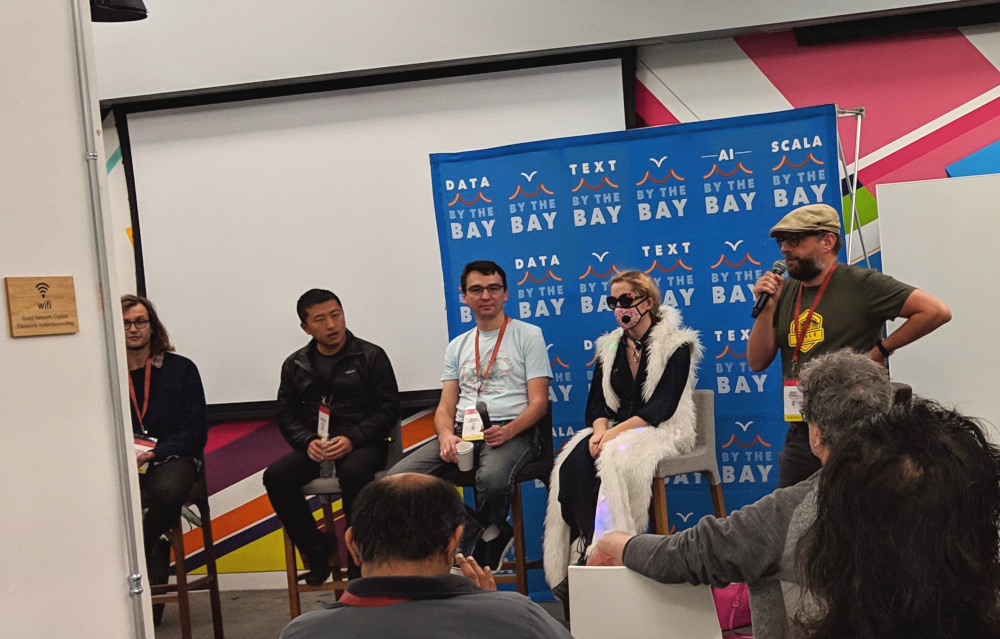So much for Big Data
« previous post | next post »
This has been a busy week for me, wherefore no posts — a full day at Penn on Monday; Tuesday and Wednesday at Baidu in Sunnyvale; Thursday at Apple in Cupertino; Friday at ETS in San Francisco; lunch with Geoff Nunberg on Saturday; and then an afternoon at Scale By The Bay 2018. There were a lot of instructive and productive exchanges, but by far the most amusing moment was the point in the final Scale-By-The-Bay panel when one of the participants observed that "Big Data is so 2012"…

D.O. said,
November 18, 2018 @ 10:22 am
My impression is that "Big X" means "large corporations in the industry X" (not in snowclone database). But Big Data is not of that kind. Large data-crunching corporations are still just a part of Big Tech. Maybe because there are no massive players who are exclusively in the data-crunching business (Google is the closest and one company doesn't an industry make. Or does it?). Peak data, in it's idiomatic snowclone sense (idioclone sense?), doesn't seem to arrive yet.
[(myl) (a) I didn't say it was true, just that it was amusing (though I think it's also true, in the domain of tech-PR memetics anyhow, where the current buzz is more blockchain and edge computing and IOT). (b) The panelist intended it ironically. (c) Ironic or not, it leads naturally to a discussion of the six different meanings of "Data Science"… ]
Secretivek said,
November 18, 2018 @ 10:58 am
Accurate, but really it's just a change in marketing term trends. "Big Data" was supplanted "Data Analytics", which has been replaced with "AI" and "Machine Learning".
[(myl) Terminological fashions among the bay-area technorati, yes — but the same panel opined that what's hot now is blockchain, edge computing, and IOT. Which is not just the same content with different labels.]
Mark P said,
November 19, 2018 @ 10:49 am
I saw or heard a reference to a "data scientist" a few days ago and i was wondering exactly what that meant. A statistician? Mathematician? A good programmer who knows how to deal with large data sets? I just googled the term and from my initial impression, I agree with Nate Silver that data science sounds like a sexed-up term for statistics. It reminds me of when my advisor talked about fuzzy logic in programming back in the 1980's. All I could think of was that no matter what you call it, all computers know is 1 or 0.
KC said,
November 21, 2018 @ 8:14 pm
Secretivek is essentially right, it's just a commentary on which buzzwords are en vogue at the moment. I'd say data analytics was first, then it was about big data (and still is though it doesn't feel cutting edge enough to simply refer to it as big data anymore). Machine Learning is very much the trendy term now, meaning basically the same as what I am used to calling predictive modeling. But you're out of touch to refer to it that way now (I'm out of touch at 34…).
I myself only recently learned that ML is used to discuss techniques much broader (and less impressive) than unsupervised learning and big data techniques that I believed it referred to. AI is also thrown around in much broader areas than it really deserves to be. Everybody wants to sound on the cutting edge.
@Mark P, data science is basically applied stats, yeah. I would legitimately make a distinction between a statistician and a mathematician, fwiw. Data scientist is another term that has had a pretty quick evolution, and has become somewhat watered down by the inexorable social tide of wanting a job title that sounds fancier than what the actual job is. Who wants to be an analyst when you can be a data scientist! Especially when the term analyst has been appropriated by the part time high school kid who types survey results into Excel and makes a pivot table summary. I exaggerate (perhaps) to make a point.
Geoff Nunberg said,
December 6, 2018 @ 3:04 am
The participant's remark was clearly a nod to a Fresh Air language commentary I broadcast on December 29, 2012, "Forget YOLO: Why 'Big Data' Should Be The Word Of The Year," which presumably precipitated the phrase's eclipse. One sometimes loses sight of the vast cultural influence one wields.